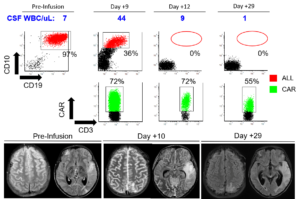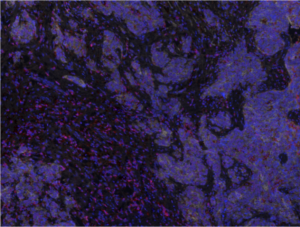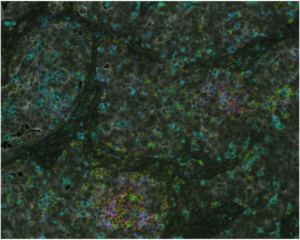Cancer Immunology and Immunotherapy
About


 Understanding the Immunology of Cancer has provided tremendous benefit to patients in recent years. Research at UVA has fundamentally contributed to these advances, beginning with the early identification of tumor proteins targeted by T cells in melanoma patients. Current research areas studied include the interactions between newly formed tumor cells and both innate and adaptive immune cells, the role of myeloid cells (e.g. macrophages, antigen presenting cells) in the regulation of the tumor microenvironment, how lymphocytes traffic to tumors, and how tumors hide from them, and the relationship between a patient’s microbiome and their immune cells in different cancers.
Understanding the Immunology of Cancer has provided tremendous benefit to patients in recent years. Research at UVA has fundamentally contributed to these advances, beginning with the early identification of tumor proteins targeted by T cells in melanoma patients. Current research areas studied include the interactions between newly formed tumor cells and both innate and adaptive immune cells, the role of myeloid cells (e.g. macrophages, antigen presenting cells) in the regulation of the tumor microenvironment, how lymphocytes traffic to tumors, and how tumors hide from them, and the relationship between a patient’s microbiome and their immune cells in different cancers.
Further translational research is being performed in the identification of specific cellular targets that can be used for anti-cancer therapies, the development of anti-tumor vaccines and the immunological optimization of these therapies. For example, combining standard immunotherapy with focused ultrasound or irradiation may be a much more effective way to treat patients to provide long-term protection against recurrent disease.
The cancer immunology community at UVA, with over 20 independently funded investigators, is incredibly vibrant and supported by two training grants; the Immunology and the Cancer Training Grants, and by UVA’s Comprehensive Cancer Center. It is an invigorating field of study, extensively interacts with other discovery research programs in BIMS, and provides a pathway for knowledge learned in the lab to be translated to clinical trials, with reverse translation from patients also at the forefront.
Faculty
Anderson, Kristin
Engineering cancer-killing T cells to overcome obstacles in solid tumors
Bailey, Stefanie R.
Increasing the safety and efficacy of engineered T cells for patients with solid tumors
Bullock, Timothy N.
Pathways to enhance T cell function in tumors.
Cook, Danielle R.
Immuno-Oncology, T cell therapy, TCR Discovery, Next generation cell therapy
Dolatshahi, Sepideh
Systems Immunology, Cancer Systems Biology, , Neonatal and Maternal Immunology
Dudley, Andrew
Tumor microenvironment and mechanisms of tumor neovascularization
Engelhard, Victor H.
Identification of MHC-restricted tumor antigens / Control of T cell homing to tumors / Tertiary lymphoid structures and intratumoral immunity
Ewald, Sarah E
Innate immunity, chronic disease, host-parasite interactions, Toxoplasma gondii, proteomics
Li, Hui
Gene regulation in cancer, RNA processing; Epigenetic modification; Stem cell and development
Loughran, Jr., Thomas P
Hematologic malignancies; bone marrow disorders; leukemia; large granular lymphocyte (LGL)
Martin, Timothy D
Identifying tumor selective drug targets, Understanding the genetic drivers of tumor immune evasion
Mauldin, Ileana Soto
Pathology
Park, Kwon
Mechanisms of tissue/organ homeostasis and tumorigeensis
Price, Richard J.
Image Guided Drug and Gene Delivery for Neurodegeneration and Cancer; Focused Ultrasound and Immunotherapy; Arteriogenesis and Angiogenesis
Purow, Benjamin W.
Novel therapeutic approaches to brain cancers and to other neurologic diseases
Rutkowski, Melanie
Influence of commensal microbes on immune homeostasis, anti-tumor immunity, and metastasis
Sheybani, Natasha
Biomedical Engineering
Sun, Jie
Viral immunology, T cells, Macrophages, Tissue repair
Taylor, Justin J
B cell Analysis and Engineering
Wang, Qiwei
Cancer biology and immunology, Immuno-oncology, Immunometabolism, Genetically-engineered mouse models
Witt, Russell Gardner
Unraveling the Role of Obesity, Diet, and Lifestyle Factors in Melanoma Progression and Treatment Efficacy
Xie, Jinghang
Molecular Imaging; Cancer Immunology; Vaccines; Antibiotic Resistance.
Zong, Hui
Early detection, cancer prevention, and tumor microenvironment
